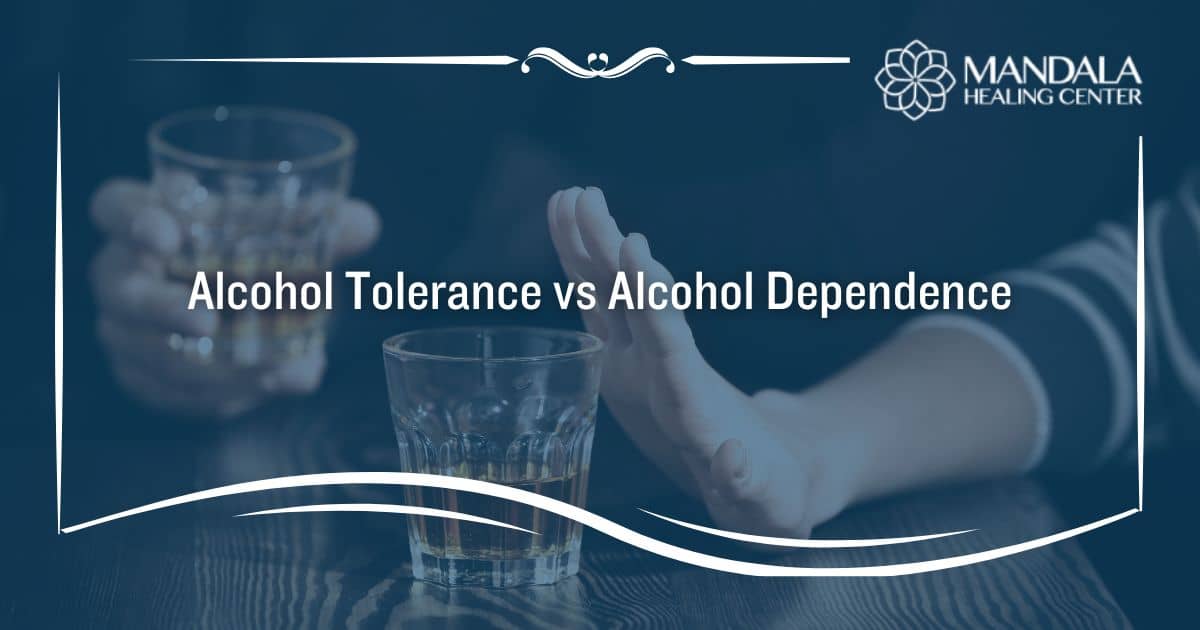Alcohol use is common and widely accepted in the United States. Many people drink alcohol occasionally in different settings. People may drink while sharing a meal, attending a sporting event, celebrating a special occasion, and in many other settings.
While alcohol use is common, some people struggle with an unhealthy relationship with drinking. People may develop unhealthy, destructive patterns of alcohol abuse that threaten their short and long-term health and well-being.
It can be challenging to determine where typical moderate drinking stops and unhealthy alcohol consumption starts. However, understanding the risks of alcohol abuse and knowing the signs can help you identify a problem and seek treatment as soon as possible.
One important question is about the difference between alcohol tolerance vs dependence. Are they the same, and are they both problems? This guide will explore the differences and similarities between alcohol tolerance and dependence. You’ll learn information about identifying unhealthy drinking patterns and how to find the treatment you need.
Reach out to the caring Mandala Healing Center specialists now to explore our holistic substance abuse treatment programs or to find support at any stage of your recovery.
Alcohol Tolerance
Alcohol tolerance means that a person needs to drink more alcohol to feel its effects. For example, someone who regularly drinks two glasses of wine each night may discover over time that they require three glasses to feel the warm buzz they enjoy. With regular alcohol use, people may develop higher tolerance, meaning they need to constantly increase the amount they drink to feel alcohol’s effects.
There are two components to alcohol tolerance.
- Metabolic tolerance: The liver becomes more efficient at metabolizing alcohol
- Environmental tolerance: People become accustomed to drinking alcohol in the same setting–such as a familiar bar or at home–and do not feel the effects of alcohol as strongly. If they drink in a new location, they may feel the effects of alcohol more quickly.
Even those who drink in moderation may increase their tolerance over time. For example, people in cultures where people drink wine with every meal may not feel alcohol’s effects but are not in danger of developing dependence or addiction. However, tolerance is one of the key signs of alcohol abuse and can cause people to drink heavily over time. Long-term heavy drinking can lead to dependence.
Alcohol Dependency
Alcohol dependence describes a condition where people must consume alcohol to function normally. People typically become emotionally or physically dependent on alcohol after prolonged periods of regular, heavy drinking.
Some characteristics of alcohol dependence include:
- High alcohol tolerance
- Experiencing withdrawal symptoms if you stop drinking
- Needing to drink to stop or avoid withdrawal symptoms
- Feeling compelled to drink even if you want to stop
- Drinking larger amounts for longer periods
People with alcohol dependence must drink to avoid experiencing withdrawal symptoms, which can include:
- Sweating
- Nausea
- Headache
- Tremors
- Anxiety
- Agitation
Once your body becomes accustomed to the presence of alcohol, it is tough to stop drinking without professional help and ongoing treatment.
Alcohol Tolerance vs Dependence: What Are the Differences?
People sometimes use the terms “tolerance” and “dependence” to mean the same thing: alcohol abuse. But tolerance and dependence are different conditions. So what are the differences between alcohol tolerance vs dependence?
Tolerance means that a substance is less effective. Biological and psychological processes reduce a substance’s impact on your body, meaning you need to use more of it to get the desired effects. While tolerance can lead to patterns of drinking that may result in addiction, tolerance is not the same as dependence or addiction.
Physical dependence is also not addiction–but it can lead to it. While tolerance means that you need to take more of a substance to feel its effects, dependence means that you need to use it for your body to function.
Recognizing Signs That Tolerance or Dependence Has Turned to Addiction
Addiction causes significant physical, behavioral, and emotional changes. Recognizing them early can help you get the treatment you need quickly.
Some of the signs of alcohol addiction include:
- Drinking more than you intended to
- Spending a lot of time and energy getting alcohol, drinking, and recovering from hangovers
- Hiding or being secretive about your drinking
- Taking risks while intoxicated, such as driving or having unsafe sex
- Losing interest in your hobbies
- Neglecting your responsibilities at home, work, or school
- Experiencing withdrawal symptoms if you stop drinking
- Wanting to stop drinking but feeling like you can’t
- Having cravings for alcohol if you stop drinking or drink less
Alcohol addiction is a serious, complex condition that requires comprehensive treatment and ongoing support. Seek treatment as soon as you recognize a problem.
Get Help Now
You don’t have to live with alcohol abuse or addiction. Comprehensive, compassionate treatment is available at the Mandala Healing Center. Reach out to our team today to explore our holistic treatment programs or to find support at any stage of your recovery.












